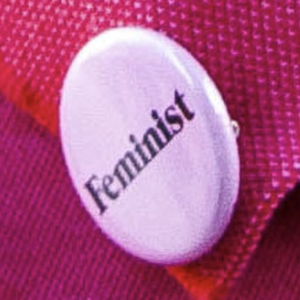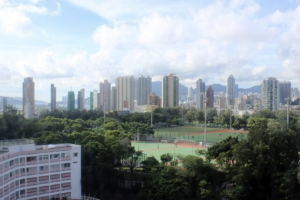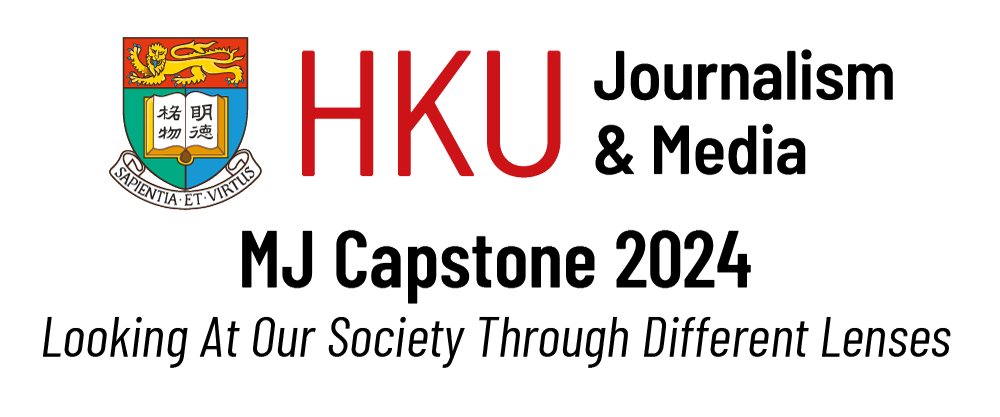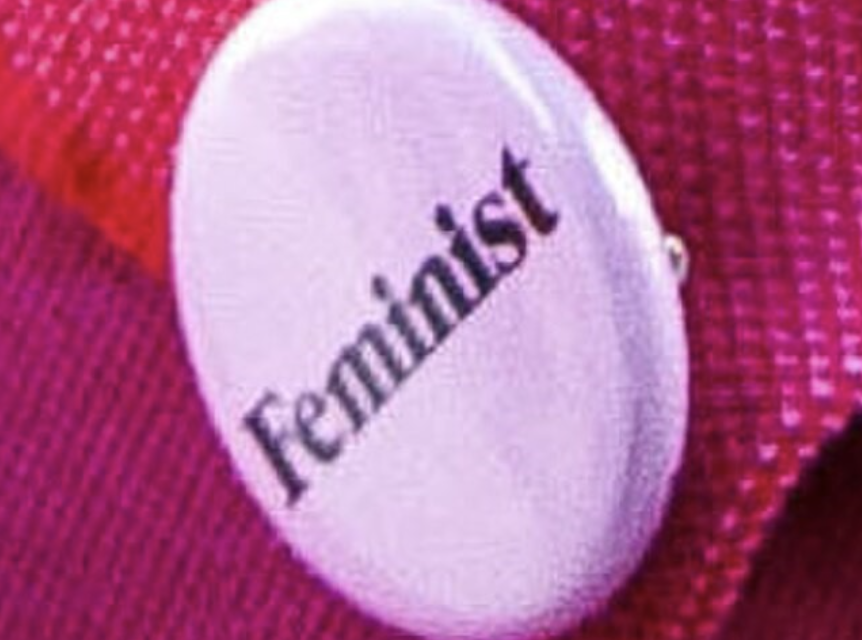By Ray Jia
HKU Journalism and Media Studies Centre

Button seen at the Rally for Reproductive Rights, Chicago, Illinois. Photo by Charles Edward Miller, Creative Commons.
HONG KONG – In March 2023, two undergraduate students Caton Chen and Globu Xu from one of Hong Kong’s top eight public universities decided to establish a feminist student association at their school. They said they had identified a narrowing of the feminism discussion space on campus.
“I’ve heard a lot of my friends who have uncomfortable experiences as a female, but seldom can they reflect these things from a society perspective,” said Chen. “We wanted to establish a student association to gather individuals’ experiences, find the structural failures behind it and promote the development of society.”
At the time, they didn’t think their plans were unusual.
However, they soon realized that even though 86 student organizations exist at their university as of spring 2024, including clubs for performing arts and robotics, and one on sustainability, there are no feminist groups.
Their school was not unusual. Across Hong Kong’s top eight public universities, there are currently more than 600 student societies officially registered with the universities. But HKU Journalism looked at the long list of student groups and discovered that none of them is devoted to feminist issues or causes.
This phenomenon may relate to the advancement in the protection of women’s and other rights in Hong Kong in the past few decades which has made many people think there’s no need for feminist groups to fight for the rights of women, but also could be due to a misconception of what feminism is about, according to experts.
Difficulties setting up a feminist student association
Chen and Xu spent a week waiting for the school Student Union’s reply to their questions about application regulations. The two students explained that, over the following month, university staff “passed the buck” between the Student Union and the Office of Student Affairs. They said they were stuck in the middle of complicated administrative procedures.
According to Chen and Xu, all student associations at their university should be registered under the Student Union, and participants need to pay membership fees. However, the Office of Student Affairs announced it was abolishing the Student Union in February 2022, which resulted in a severe weakening of its operation and confusion over the student-related regulations.
“I don’t know if the situation is unique to our school. The Student Union is now in a state where it has a lot of power, but no one is actually in charge of it. For example, a lot of the rules are updated without any form of public disclosure,” Chen said. “I feel like it may take you a whole year to establish an association as a student without any external organization to back you up.”
According to the university’s official website, the application for student group registration “may take up to 10-15 working days for processing.”
At the time of reporting, the Student Union information page with contact information had been removed from the official website. The Student Union and Office of Student Affairs at the university did not reply to repeated requests for comments or explanations.
Chen and Xu prepared and submitted an application, but never received a firm reply, either positive or negative. They said this failure made them feel that the autonomy of students in organizing clubs and other student-related activities on campus is suppressed.
“Some professors told us that the university is very strict in regulating student activities, and they are cautious about all actions that may affect the reputation of the school,” Chen said.
However, what made them more frustrated is the fading popularity and support for feminism among their cohorts.

The Hong Kong skyline as seen from a HKBU dormitory. Photo by Mimihitam, Creative Commons.
Early pioneers of women’s rights
There was a golden age for feminism in Hong Kong. It began in the 1960s, according to social science researchers. Adelyn Lim, author of “Transnational Feminism and Women’s Movements in Post-1997 Hong Kong,” stated that: “By the end of the 1960s… women activists in Hong Kong began to localize their agenda.”
Wong Yuk Ying, lecturer at the Gender Study Program at the Chinese University of Hong Kong, credits second-wave feminism spreading from the United States, along with the local worker movements, and the Christian movement, which happened from the 1960s to 1980s, as the origins of Hong Kong’s booming society-wide discussion on feminism. With the passing of the Sex Discrimination Ordinance and introduction of the Convention on the Elimination of All Forms of Discrimination against Women in 1996, Hong Kong made significant progress in terms of gender equality.
During this period, the social discussion about feminism focused mainly on labor rights, workplace equality, education, and domestic violence. According to Lim, public organizations that emerged in the 1980s, including the Association for the Advancement of Feminism (1984), the Hong Kong Women Christian Council (1988), and the Hong Kong Women Workers Association (1989), led the way on these issues.
In 1994, the Female Study Association was established at the Chinese University of Hong Kong and it printed a newspaper periodically, as the discussion of gender issues heated up on campus in the early 1990s, according to CU40, the anniversary publication at CUHK. As CU40 reported, sexual harassment was one of the focuses of the Association.
However, the Female Study Association ended its operation a few years later with its last publication in November 1999. CU40 quoted Kenny Jim, a former member of the Association, as saying that “not many students responded positively to activities of the Female Study Association. …. The struggle between ideals and reality is even more intense, and activities that rely solely on ‘ideal’ may not be able to attract as many students as in the past.”
Wong recalled that the actress Emma Watson’s mention of the University of Hong Kong under UN’s HeForShe movement in 2016 “was the last time that I remember people were really actively campaigning for feminism in universities in Hong Kong.”
Amy Yeung, the executive secretary of The Association for the Advancement of Feminism, said that students’ fading interest in feminism may reflect the achievements in promoting gender equality that Hong Kong has made in the past few decades.
“Improvements in legislation and the establishment of the Equal Opportunities Commission have made it possible for complaints of gender discrimination in society to be properly addressed, thus the discussion about it gradually decreased,” she said.
Wong didn’t entirely disagree with this opinion but also pointed out that women’s difficulties have become more invisible.
“Hong Kong is one of the safest places where you can be a woman, but there’s also a lot of micro aggression in daily life,” Wong said. “It’s not like the kind of inequality that we’re used to, or we have vocabulary to be talking about.”
Stigmatization of ‘feminism’
Another phenomenon that confused students Chen and Xu is the intangible stigmatization of the word “feminism”. During a talk with a professor about their proposal to set up a feminist student society, it was suggested that they replace “feminism” with “rights equality.” Chen and Xu said the professor told them that “feminism” is an obsolete cliché that didn’t deserve further discussion.
Yeung elaborated on this mindset.
She said “the word ‘feminism’ is not often used to discuss gender issues in Hong Kong. Women are not the only group that’s suffering from gender discrimination; that also includes gender minorities, men, and transgenders. We want to improve the living situations not only for females, but also our allies. It is too narrow if we only approach these questions through the lens of feminism.”
However, from Chen and Xu’s perspective, the changes on the wording weaken the “society-transforming” ambition of “feminism” even though they do acknowledge the obstacles that this word created for their proposals. They heard from local friends that the word ‘feminism’ was severely stigmatized in Hong Kong.
“It is not even a neutral term here,” said Xu. “Some classmates will think that feminism is the idea from Western female celebrities who think that women’s status should completely be superior to that of men.”
In some ways, incorporating feminism into the discussion of sexual minorities does make the topic more accessible. But Chen and Xu said they don’t want to make that compromise. In an article they posted on Instagram explaining why they call their group a feminist one, they wrote:“Egalitarianism, flattened in the popular view, in practice tends to lead to new patterns of categorization and hidden inequalities, and the dominance of masculinity may be reproduced.”
Less involvement in campus student-led activities
It wasn’t just the sensitive name of their society that complicated the situation with the student union and the university administrative departments. Chen and Xu said they clearly felt that students’ autonomy over student-led activities has been frustrated in general.
They recently planned to organize a lecture with the help of other student groups but found that most academic societies were in name only and did not have members to run events.
Chen and Xu are not the only students who have perceived tighter control and weakening student involvement at universities. Cheung Tsz Ching, a final-year undergraduate at the University of Hong Kong, is the founder of a gender-related social advocacy group. She said she thinks that students’ attitudes might have something to do with the social protest movement in 2019.
“Since 2019, they have found that no matter what level of advocacy they do, there is no way to change the social status quo, so they choose not to participate in social advocacy related activities,” Cheung said.
Yeung, whose association has been active for 40 years, expressed the same concerns.
“Social movements in 2019 may indeed be a big factor,” she said. “While it may not necessarily be because students are directly confronted with political pressure, it is more because they see that the room for discussion of public issues in Hong Kong is gradually shrinking, so what is the need for them to spend effort on it?”
Finding a voice off-campus
Cheung, the student who founded a social advocacy group, said her organization is not a “proper” one.
She and two schoolmates, who took a political science course together, decided to set up a social advocacy organization about human rights.
“After our discussion, we found that, although there are many feminist organizations in Hong Kong, they are very different from each other, and it seems that none of them are particularly concerned about the issue of masculinity. So, we thought we could think about this issue from a different angle. Here is where ‘Mascostory’ comes from,” Cheung said, referring to the name of her organization.
They launched social media accounts in March 2023 and, over several months, actively posted articles they wrote. Their public workshops in July and August 2023 were organized at One Bite Society Project House as well as at a West Kowloon café, where they discussed household labor division, gender stereotypes, and the concept of the “Drama Queen.”
Her group hasn’t been officially registered as a non-profit organization or student association.
“The main advantage for a registered group is you can enjoy some benefits in external funding applications. But our advocacy organization, compared to service providers, doesn’t have many monetary pressures during our operation,” Cheung said.
After being deeply involved in feminist advocacy activities, Cheung said she felt disappointed with the traditional gender conceptions in the city. She found that a street interview activity her group conducted revealed a “ridiculous” reaction, even from well-educated men, when they were asked what words best represent “man” and “woman.” She said people still can’t get rid of a pedantic ideology that bundles together “male,”, “homophobia” and “heterosexuality.”
Reflecting on the current state of feminism in Hong Kong, Cheung said: “Actually, being an echo chamber is the problem that not only my own organization, but all feminists should be aware of. The people we attract are the people who are originally following these issues. I don’t know if we can really make any difference in the future that can affect society at large.”
Since the watershed year of 1996, the process of gender equality in Hong Kong seems to have entered a new chapter, but there is still much backwardness to be reckoned with, both in terms of awareness and practice, according to recent statistics.
A survey conducted by the Education University of Hong Kong and the Hong Kong Baptist University in 2021 showed that among almost 2,000 male university students, over 75% of the men surveyed held conservative views towards gender roles and had negative perceptions of changing gender relations to varying degrees.
The situation for women in the workplace isn’t improving either. The latest figures released by the Census and Statistics Department of the government reveal that, by the end of 2023, only 52% of women were participating in the workforce, compared with 63% of men. This number is even lower than that of five years ago when it was 55%.
The persistent pay gap between men and women also still exists. A 2019 report from the Women’s Foundation showed that women earn an average of 22% less pay than men in Hong Kong. The latest gender equality report released by the Equal Opportunities Commission in 2021 stated that one in five mothers reported experiencing discrimination during pregnancy, maternity leave, and/or within the first year after returning to work, while only 17% of employers reported having implemented family-friendly measures in the workplace.
However, positive changes are also taking place. To enhance the protection from harassment for breastfeeding women, the Legislative Council passed the 2020 Sex Discrimination (Amendment) Bill in March 2021, which came into effect in June of the same year.
Almost one year after their feminist group failed, Chen and Xu finally obtained the support of a professor and their university. In February they were allowed to set up a “gender study academic society,” under the school’s gender study concentration program.
They said they are expecting the funding provided from the university for setting up the group will be enough for them to realize their long-buried proposals for their club, including holding an academic forum and providing community services.
“Feminism is not merely an academic theory,” Chen said. “I wish I can really do something practical to help women value and empower their rights.”
They haven’t deleted the old Instagram account they created for the feminism association. They said they hope that maybe one day, maybe outside of the school, maybe outside of the city, a new post will appear at the top of the account and announce: “We are finally here.”
Advisor: Jennifer Deayton

